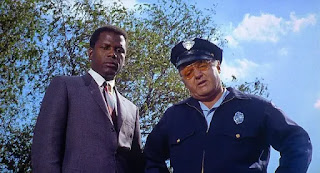In none of Vergil's initial introductions with any native residents of Sparta is he greeted with any form of respect. He is immediately looked down upon, until either, he pulls out his police badge, or sheriff Gillespie assures them that he is working for him. Interestingly, the only exception to this pattern was Eric Endicott(played by Larry Gates), a wealthy plantation owner and prime suspect for the murder of Colbert, as he was very vocal of his opposition to his factory. When Endicott meets Tibbs, he doesn't appear to look at him with any scorn, but rather offers him a drink and talks to him about flowers. This isn't due to respect for Tibbs, however, which is made clear through his statement about a specific flower which he believed "needed to be cultivated, just like the Negro race." Endicott greeted Tibbs with no hostility initially simply because he saw him as no more than a pet or one of the plant he grows in his greenhouse.
Once Tibbs accuses Endicott of the murder, he slaps him and is shocked when Tibbs retaliates. He says "There was a time when I could have had you shot," and begins to cry when everyone leaves the room. This scene is perfect in depicting the social climate of America at the time, a time where racist whites, like Endicott, have to grasp with the reality that the world as they knew it was slipping away and they were rightfully losing their power over the lives and actions of African Americans.
This scene also is an important development in the relationship between Tibbs and Gillespie. Throughout the film, Gillespie tries to assert his perceived racial superiority to Tibbs, yet constantly lashes out at him due to feeling inferior to him. He subconsciously believes that Tibbs is better than him and tries to put whoever he can behind bars to prove that he didn't need his help. Following the Endicott incident however, Tibbs claims he "can drag Endicott off of his hill" if given just two more days and Gillespie smiles saying "Oh, so you really are no different from us, huh?" Though this would be a seemingly good realization to have for a racist White man, the film frames it as a moral failing on Tibbs' part. I find this contrast in perception very interesting to watch. Whereas Gillespie now sees Tibbs' outburst as proof that he's also like the working-class who want to drag down the wealthy from their perch, Tibbs views it as a failure in his duty to find the truth and sinking to the moral plane of the local police who don't care about the truth and only want a convict.
Tibbs only has one interaction with a Black person in the film, and its Mama Caleba(played by Beah Richards), who runs an illegal abortion clinic and their conversation also provides great insight to the social climate of the time period. Mama Caleba is confused as to why Tibbs would have chosen to be a police officer claiming that "they will chew you up and spit you out." Tibbs knows that the murderer is whoever is paying for Delores Purdy's abortion and he threatens her with jail time, saying"there's white time in jail and colored time in jail: the worst kind of time you can do is colored time." Mama Caleba talks about how her business's success had gotten her out of poverty and how she is now used to better, making Tibbs promise not to take it away before she offers any information, which he obliges.
Their short conversation displays not only the psychology of a community who had been mistreated horribly by the systems designed to protect them, but also the solidarity within it for those who found ways out of the pit they were placed in.
Overall the film is very entertaining. Not only for its plot, but also the peek it gives the audience into the social climate during the Civil Rights Era.








No comments:
Post a Comment